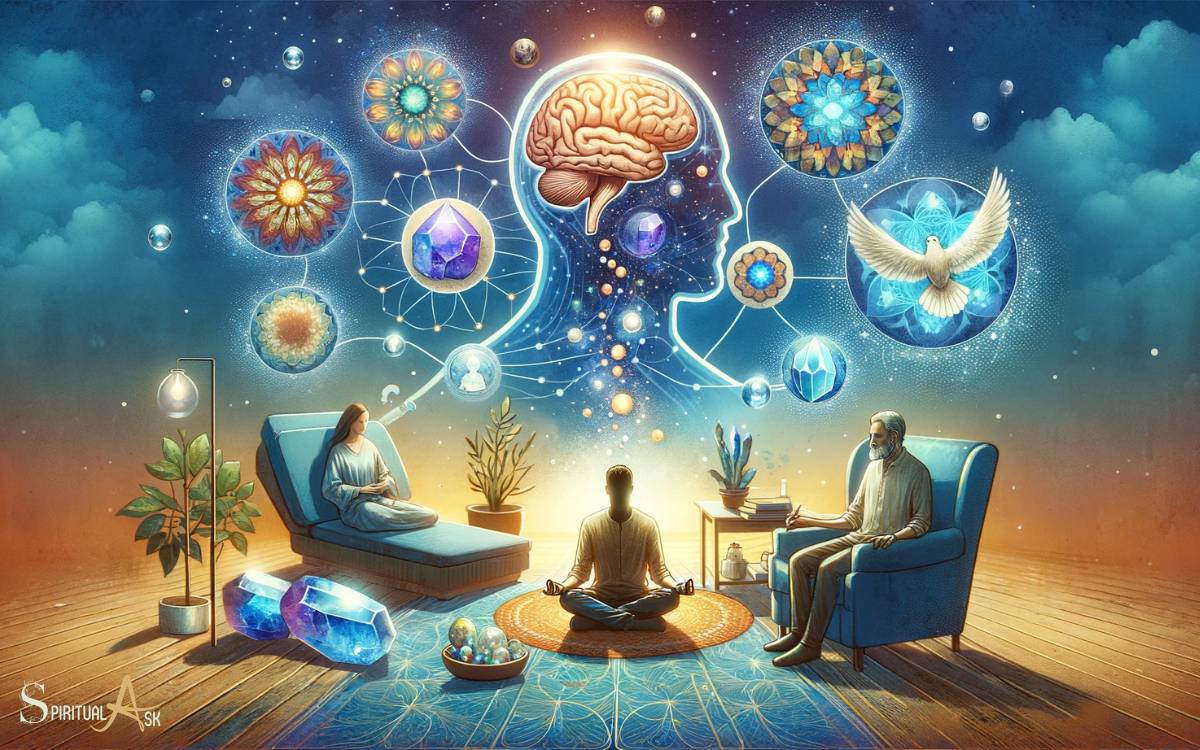Mental Disorders and Spiritual Healing: Explain!
The connection between mental disorders and spiritual healing is increasingly recognized as a beneficial complement in mental health care.
Spiritual practices like meditation and mindfulness can significantly contribute to the treatment and management of mental illnesses, offering individuals an additional avenue for coping and recovery.
Mental disorders encompass a range of psychological conditions that can affect a person’s emotional well-being and daily functioning. Spiritual healing refers to the use of spiritual practices to improve mental health.
This can include:
For example, mindfulness meditation has been shown to reduce symptoms of anxiety and depression.
Spiritual healing can bring comfort and hope, fostering a sense of peace and resilience in the face of mental health challenges.

Key Takeaway
5 Spiritual Practices on Mental Disorders and Healing
| Spiritual Practice | Mental Disorder(s) Impacted | Description of Impact |
|---|---|---|
| Mindfulness Meditation | Anxiety, Depression | Reduces stress, improves emotional regulation |
| Prayer | Various Mental Disorders | Provides comfort, can reduce feelings of isolation |
| Yoga | PTSD, Anxiety, Depression | Enhances mood, promotes relaxation, improves physical health |
| Faith-based Community Support | Various Mental Disorders | Offers social support, improves sense of belonging |
| Spiritual Rituals | Various Mental Disorders | Can create a sense of control and purpose |
The Connection Between Mental Disorders and Spirituality
In my experience, the connection between mental disorders and spirituality is profound and often overlooked by traditional treatment approaches.

When struggling with my own mental health, I found that embracing spirituality provided a sense of purpose and inner peace that medication and therapy alone couldn’t offer. It’s not about replacing medical treatment, but rather complementing it with a holistic approach.
Spirituality can provide a framework for understanding and accepting one’s condition, offering comfort and hope in challenging times.
Many individuals find solace in prayer, meditation, or connecting with a higher power, which can be a source of strength in the face of adversity.
Recognizing the intersection of mental health and spirituality opens up new avenues for healing and coping strategies, offering a more comprehensive approach to well-being.
Understanding the Impact of Spiritual Healing
Embracing spirituality in my journey with mental health has deeply impacted my healing process, allowing me to find inner peace and strength in ways traditional treatment alone could not provide.

The impact of spiritual healing on mental health is profound, offering a unique approach to well-being that complements conventional methods.
Understanding this impact involves recognizing the following:
- Holistic Healing: Spiritual healing addresses the mind, body, and spirit, promoting holistic well-being and harmony.
- Resilience Building: It fosters resilience, providing individuals with the inner strength to navigate life’s challenges and manage mental health symptoms.
- Meaning-Making: Spiritual healing can help individuals find meaning and purpose, offering a sense of connection and hope amidst mental health struggles.
These insights shed light on the transformative potential of spiritual healing in the context of mental disorders, enriching the healing journey for many. In addition, the incorporation of spiritual healing into traditional mental health treatments has shown promise in addressing the spiritual dimensions of addiction. By addressing the spiritual healing addiction dimensions, individuals struggling with substance abuse or other addictive behaviors can engage in a more holistic approach to recovery. This integrated approach can provide a more comprehensive and enduring path to healing for those affected by mental disorders and addictions.
Integrating Spiritual Practices Into Treatment
Understanding the impact of spiritual healing on mental health, I found that integrating spiritual practices into treatment was essential for my holistic well-being and resilience.

Incorporating mindfulness meditation, prayer, or connecting with nature into my therapy sessions provided a sense of calm and centeredness. It allowed me to cultivate inner peace and cope with the challenges of my mental disorder.
Additionally, engaging in spiritual rituals and traditions within a supportive therapeutic environment helped me find a sense of purpose and meaning beyond my symptoms.
These practices became integral to my treatment plan, complementing other therapeutic modalities and medication.
By embracing spirituality as part of my healing journey, I experienced a profound sense of connection, hope, and empowerment, contributing significantly to my overall mental wellness.
Exploring the Role of Faith in Mental Health
My experience with mental disorders led me to explore the role of faith in my mental health.

Through this exploration, I’ve discovered the following insights:
- Support System: My faith community has provided me with a strong support system, offering understanding, compassion, and a sense of belonging during challenging times.
- Coping Mechanism: Engaging in spiritual practices such as prayer, meditation, and mindfulness has been a valuable coping mechanism, helping me find inner peace and resilience amidst mental health struggles.
- Sense of Purpose: Embracing my faith has given me a sense of purpose and hope, enabling me to find meaning in life beyond the difficulties posed by mental disorders.
Understanding the role of faith in mental health has been an integral part of my journey towards holistic healing and well-being.
Cultivating Inner Peace and Resilience

Engaging in spiritual practices has been pivotal in cultivating my inner peace and resilience amidst the challenges of mental disorders. Through prayer, meditation, and reflection, I have found solace and strength to navigate the complexities of my condition.
Here’s how these practices have helped me:
| Spiritual Practice | Impact |
|---|---|
| Prayer | Provides comfort and a sense of connection |
| Meditation | Calms the mind and reduces anxiety |
| Reflection | Fosters self-awareness and emotional healing |
These practices have not only offered me a sense of peace but have also bolstered my resilience, enabling me to face difficulties with a more grounded and centered mindset.
Harnessing the Power of Mindfulness and Meditation

I’ve found that practicing mindfulness and meditation has been instrumental in managing my mental disorders. When I engage in these practices, I experience a sense of calm and clarity that helps me navigate the challenges of my conditions.
Here are three key benefits of mindfulness and meditation for managing mental disorders:
- Reduced Stress: Mindfulness and meditation techniques help me to reduce stress and anxiety, allowing me to better cope with the daily struggles of my mental disorders.
- Improved Emotional Regulation: These practices have enhanced my ability to regulate my emotions, leading to a greater sense of stability and control in my life.
- Increased Self-Awareness: Mindfulness and meditation have allowed me to develop a deeper understanding of my thoughts and feelings, empowering me to address them more effectively.
Nurturing Hope and Purpose in Healing
Navigating the journey of healing from mental disorders involves nurturing hope and purpose. When I was struggling, it was easy to feel lost and overwhelmed, but finding hope and purpose became a guiding light.

It’s crucial to focus on the things that bring joy and meaning, whether it’s spending time with loved ones, pursuing a passion, or helping others.
For me, setting small, achievable goals provided a sense of purpose and accomplishment, gradually restoring my confidence.
Additionally, seeking out supportive communities and engaging in activities that foster a sense of belonging can be incredibly uplifting.
Embracing hope and purpose doesn’t mean denying the reality of the challenges we face, but rather, it empowers us to keep moving forward with resilience and determination.
Embracing Holistic Well-being in Recovery
As I reflect on my journey toward healing, I’ve come to recognize the profound connection between my mental and physical well-being.
Embracing holistic recovery means acknowledging the intricate interplay between my mind and body, and actively seeking treatments that address both aspects.

Integrating my faith with therapy has been a pivotal part of my healing journey, providing a comprehensive approach that nurtures my spiritual, emotional, and physical well-being.
Mind-Body Connection in Healing
The connection between the mind and body plays a crucial role in achieving holistic well-being during the recovery process. Understanding this intricate relationship is essential for promoting overall health and healing.
Here are three key ways in which the mind-body connection impacts holistic well-being in recovery:
- Physical Manifestation of Mental Health: The state of our mental health can often manifest physically, emphasizing the need to address both aspects in tandem.
- Stress Reduction Techniques: Implementing stress-reducing practices such as meditation, yoga, and deep breathing exercises can positively impact both mental and physical well-being.
- Nutrition and Mental Health: Nourishing the body with a balanced diet not only supports physical health but also contributes to improved mental well-being.
Recognizing and nurturing this mind-body connection is pivotal in achieving holistic well-being during the recovery process. It sets the stage for a more comprehensive approach to healing, encompassing both mental and physical aspects.
Integrating Faith and Therapy
With regard to achieving holistic well-being in recovery, I find that integrating faith and therapy offers a comprehensive approach to healing. It acknowledges the importance of addressing mental health through both psychological and spiritual means.
Integrating faith and therapy allows individuals to receive psychological support while also benefiting from spiritual guidance, creating a more holistic approach to healing.
It enhances coping mechanisms by providing a deeper sense of purpose and hope, which can be instrumental in the recovery journey.
By embracing both faith and therapy, individuals can experience comprehensive support that addresses their mental, emotional, and spiritual needs.
Conclusion
In the journey of mental health, spirituality serves as the guiding light through the dark forest of our minds. Like a gentle breeze that carries the scent of blooming flowers, spiritual healing brings a sense of peace and renewal to our weary souls.
It is the quiet whisper of hope that leads us out of the labyrinth of despair, reminding us that healing is possible and that we are never alone in our struggle.






